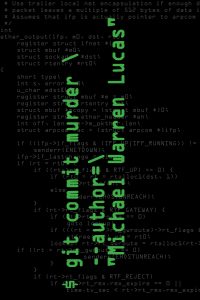Pardon the long post, but this might both save me some time and help other authors in a similar position. (I’m not aware of any others in my position, but I’m sure they exist.) Also, I try to make data-driven decisions rather than jumping on the Latest Bandwagon, which is notoriously difficult in a business like publishing that provides very little data.
I’ve been writing under the name Michael W Lucas for decades now. I used that name on the very first book that I published. For my first tech book I used Michael Lucas, but changed it immediately afterwards because I couldn’t compete.
A few years ago, I split into Michael W Lucas (tech) and Michael Warren Lucas (fiction). Publishing in two wildly different fields confused both readers and Amazon’s recommendation engine. While my long-term plan involves reducing Amazon’s importance as a sales channel, other sites use similar algorithms. And I doubt I’ll ever eliminate outside sales channels–even James Patterson can’t swing that.
So I have to ride the algorithms.
I’ll use Amazon as an example because the public can easily extract data from them. Amazon says “Hey, enough people who bought X also bought Y, so we’ll point that out and try to sell them more stuff.” Observe Amazon’s algorithms in action by using Yasiv’s Also Bought visualization tool. Here’s my Kindle Also Boughts for my nonfiction. Amazon has also noticed that people who buy books on TLS, PGP, ZFS, and PF have bought SSH Mastery.
When someone looks at the entry for, say, Bulletproof SSL and TLS, Amazon shows them an ad for SSH Mastery.
These ads are critical for expanding my readership. Books with incoming links are my best-sellers. While correlation is not causation, from talking to readers and observing my own behavior I’d say they clearly work.
Yasiv also shows that people who buy one of my books have also bought a bunch more of my books. This shows that my writing appeals to a certain group of people. Folks who try one of my books get hooked. Amazon is validating my writer skills here, in graphical form.
Note that the Also Bought recommendation engine clearly splits books by genre. I’m highly confident that my readership includes a bunch of folks who read, say, Peter F Hamilton, John Scalzi, Heinlein, Asimov, and so on. But the recommendation engine mostly chops those things off. You have to sell a whole bunch of stuff to get the recommendation engine to cross genres. My Kindle nonfiction Yasiv graph shows that folks who bought my DNSSEC and Tarsnap books also bought git commit murder, but it’s very much an outlier. It’s even graphed as an outlier.
Now let’s hit the clutch, and look at fiction. My fiction is gaining popularity. Measured in dollars, the sales each month are usually a little better than those beforehand. I write crime thrillers, science fiction, and mystery.
So let’s consider Amazon’s Kindle Also Boughts for my fiction.
This really isn’t good.
My fiction exists as a little island. My books all connect to each other. People who like my books tend to buy several. Once my audience finds me, they stay. My readers also like Octavia Butler and Charlie Stross, though, so I’m reasonably confident in the writing itself. Those links are one-way, however: people leave my island for Stross, but never return.
(Note that not all of my books are here. If I wanted to be really depressed, I’d check out the Also Boughts for the latest Montague Portal novel… but I don’t want to be really depressed, so I won’t. Plus, reader reaction to that book was excellent, so Amazon’s recommendation engine can go jump off a bridge.)
Without those incoming Also Boughts, there’s no career here.
I’ve been doing a bunch of reading on how Also Boughts work. Amazon divides the Also Boughts by consistency of readership. I write in multiple genres. An author name with fewer sales and fewer titles but greater consistency of readership gets recommended to other readers. An author name with more titles but inconsistent readership… does not.
Some writers have recommended concentrating on one genre. I understand their reasons for that recommendation, but in my case that’s not likely to happen. The stories I want to write do not respect genre. The book I’m writing now deals with today’s human trafficking, and I don’t care to thinly disguise the topic to write it as science fiction. And there’s no way to write my SF as crime novels.
Fiction readers rarely cross genres. A few do–I have a few loyal fans who read damn near everything I write. (Hi, Meg and Kurt!) I love those readers. But they’re the exception.
So it seems I need to split my name again.
I’m not looking forward to self-imposed multiple personality disorder. It’s a bunch of work. There’s a whole mess of covers to redo, not to mention a whole mess of ebook reformatting. I’m equipped to do it, don’t get me wrong, but it’s tedious grunt labor that I’d rather not repeat.
Which means I only want to do it once.
Rather than going with my gut, I’m requesting input from other writers who’ve been here.
The obvious split seems to be mystery & crime thrillers under one name, and the SF under another name.
I can also argue against that, though. The Immortal Clay books have very little cross-readership with the Montague Portal stories. This is not surprising: the Immortal Clay books are post-apocalyptic “Carpenter’s The Thing, but after we lose”, while the Montague Portal tales are comparatively lighthearted “let’s explore the multiverse!” romps. Similarly, git commit murder is a cozy mystery, while Butterfly Stomp Waltz and the forthcoming sequel (Terrapin Sky Tango) are crime thrillers–technically mysteries, yes, but mysteries full of blood and booms and bad language. Decidedly not cozy, if you get my drift.
But splitting into four names? Oh, come on now. Each name imposes overhead. Never mind that if my fiction takes off, I plan to write an urban theological fantasy series. (Working title: you should have learned. A couple of you probably got a funny look right there, so for you few: yes, it means exactly what you think it means.)
So I think it’s two names, plus a possible third later on.
The SF would stay under my name. The biggest reason being that it’s a suitable SF author name, while modern thriller authors who have started writing recently have shorter, punchier names. Yes, James Patterson is a long name–but he’s been around for decades. Today’s perfect thriller author name is something like, say, Brad Thor, Lee Child, Ben Coes, or Dale Brown. Single-syllable names. (Of these, I’d say Brad Thor is the best–a metal rivet and a Norse god? How much tougher do you want?) Slightly longer names like Tom Clancy and Stuart Woods also do pretty well. No, I’m not saying that these authors did well because of their names. But the names of the authors of these kinds of books in the trad published world fit into a type, and if I’m going to switch my name I want it to fit that type as well as possible.
git commit murder is something of an odd duck. The target audience is people who read my nonfiction. It’s probably going to stay under the Michael Warren Lucas brand, simply for the name recognition of “he’s in our tribe.” That book will never appeal to the Traditional Cozy Reader, and that’s okay.
I’d like to continue using https://mwl.io as a generic author landing page that branches out to specific sites for all of my names. Middle initials are not punchy. So let’s go with initials of M and L.
But what name? The first names Mack and Mick appeal to me. A surname, though? I could go for a variant on my name, like Luck. Perhaps something ominous, such as Last?
So, for those author sorts still reading this:
1) Is splitting my name a waste of time?
2) Should I split the names a different way?
3) Suggestions for a good M.L. thriller pseudonym?

 The BSD North conference draws some of the smartest people in the world. These few days will validate Dale Whitehead’s work—or expose him as a fraud.
The BSD North conference draws some of the smartest people in the world. These few days will validate Dale Whitehead’s work—or expose him as a fraud.